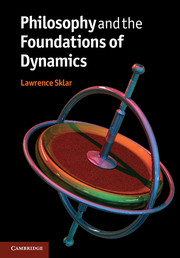Book contents
- Frontmatter
- Contents
- Chapter 1 Introduction
- Chapter 2 The pre-history of classical dynamics
- Chapter 3 The astronomical revolution
- Chapter 4 Precursors to Newtonian dynamics
- Chapter 5 The Newtonian synthesis
- Chapter 6 Philosophical aspects of the Newtonian synthesis
- Chapter 7 The history of statics
- Chapter 8 The development of dynamics after Newton
- Chapter 9 The “Newtonian” approach after Newton
- Chapter 10 From virtual work to Lagrange's equation
- Chapter 11 Extremal principles
- Chapter 12 Some philosophical reflections on explanation and theory
- Chapter 13 Conservation principles
- Chapter 14 Hamilton's equations
- Chapter 15 Canonical transformations, optical analogies and algebraic structures
- Chapter 16 The search for new foundations
- Chapter 17 New directions in the applications of dynamics
- Chapter 18 Spacetime formulations of Newtonian dynamics
- Chapter 19 Formalization: mass and force
- Chapter 20 Relationist dynamics
- Chapter 21 Modes of explanation
- Chapter 22 Retrospective and conclusions
- References
- Index
Chapter 6 - Philosophical aspects of the Newtonian synthesis
Published online by Cambridge University Press: 05 December 2012
- Frontmatter
- Contents
- Chapter 1 Introduction
- Chapter 2 The pre-history of classical dynamics
- Chapter 3 The astronomical revolution
- Chapter 4 Precursors to Newtonian dynamics
- Chapter 5 The Newtonian synthesis
- Chapter 6 Philosophical aspects of the Newtonian synthesis
- Chapter 7 The history of statics
- Chapter 8 The development of dynamics after Newton
- Chapter 9 The “Newtonian” approach after Newton
- Chapter 10 From virtual work to Lagrange's equation
- Chapter 11 Extremal principles
- Chapter 12 Some philosophical reflections on explanation and theory
- Chapter 13 Conservation principles
- Chapter 14 Hamilton's equations
- Chapter 15 Canonical transformations, optical analogies and algebraic structures
- Chapter 16 The search for new foundations
- Chapter 17 New directions in the applications of dynamics
- Chapter 18 Spacetime formulations of Newtonian dynamics
- Chapter 19 Formalization: mass and force
- Chapter 20 Relationist dynamics
- Chapter 21 Modes of explanation
- Chapter 22 Retrospective and conclusions
- References
- Index
Summary
Newton's masterful achievement was constructed under the influence of much previous philosophical discussion and controversy that went beyond the limits of scientific debate narrowly construed. Much that Newton says in the Principia also ranges beyond the confines of experimental, or even theoretical, science and passes into the realm of what we usually think of as philosophy. Newton's work gave rise, possibly more than any other work of science past or future, excepting just possibly the work of Darwin and Einstein, to vigorous philosophical as well as scientific discussion. Let us look at some of the philosophical issues behind, within and ensuing from Newton's work.
It is convenient to group the discussions into three broad categories. First, there is the “metaphysical” debate over the nature of space, time and motion. Next there is the debate over what can be properly construed as a scientific explanation of some phenomenon. Lastly, there is the controversy over what the appropriate rules are by which scientific hypotheses are to be credited with having reasonable warrant for our belief. We will discuss these three broad topics in turn.
Information
- Type
- Chapter
- Information
- Philosophy and the Foundations of Dynamics , pp. 57 - 74Publisher: Cambridge University PressPrint publication year: 2012
